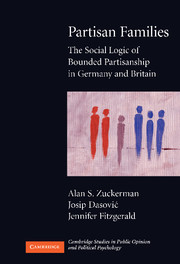Book contents
- Frontmatter
- Contents
- List of Figures and Tables
- Acknowledgments
- Preface: The Theoretical Approach, the Question, and the Data
- 1 The Social Logic of Partisanship: A Theoretical Excursion
- 2 Bounded Partisanship in Germany and Britain
- 3 A Multivariate Analysis of Partisan Support, Preference, and Constancy
- 4 Bounded Partisanship in Intimate Social Units: Husbands, Wives, and Domestic Partners
- 5 Bounded Partisanship in Intimate Social Units: Parents and Children
- 6 Partisan Constancy and Partisan Families: Turnout and Vote Choice in Recent British Elections
- Conclusion: Family Ties, Bounded Partisanship, and Party Politics in Established Democracies
- Appendix
- References
- Index
- Books in the Series
5 - Bounded Partisanship in Intimate Social Units: Parents and Children
Published online by Cambridge University Press: 05 June 2012
- Frontmatter
- Contents
- List of Figures and Tables
- Acknowledgments
- Preface: The Theoretical Approach, the Question, and the Data
- 1 The Social Logic of Partisanship: A Theoretical Excursion
- 2 Bounded Partisanship in Germany and Britain
- 3 A Multivariate Analysis of Partisan Support, Preference, and Constancy
- 4 Bounded Partisanship in Intimate Social Units: Husbands, Wives, and Domestic Partners
- 5 Bounded Partisanship in Intimate Social Units: Parents and Children
- 6 Partisan Constancy and Partisan Families: Turnout and Vote Choice in Recent British Elections
- Conclusion: Family Ties, Bounded Partisanship, and Party Politics in Established Democracies
- Appendix
- References
- Index
- Books in the Series
Summary
In established democracies, young persons, like everyone else, make decisions about the political parties. Neither mimicking nor ignoring their parents' partisan preferences, they, like their mothers and fathers, support or do not support a party and consider which one to name; they too make these decisions again and again. Unlike their parents, however, most young persons do not claim to be partisans. In Germany and Britain when they do name a party, they almost always pick the one selected by their mother and father. Like their parents too, young Germans and Britons are usually bounded partisans, varying their announced choices between Party A/B and no partisan preference, rarely moving between the two parties. And during the years of the surveys, as their parents – particularly their mothers – increasingly announce that they support no party, the rate by which their children deny that they support a party also rises.
The social logic of partisanship suggests a series of hypotheses to account for political influence across generations within families: (1) Frequent interactions and high levels of trust induce members of households to influence each other. (2) Where two members of the household agree, partisan influence is especially high. (3) The relative distribution of past learning in the household makes children especially likely to take partisan cues from their parents. (4) Because mothers interact more frequently with their children than do fathers and because members of the younger generation are more likely to trust their mothers than their fathers, she has more influence over the children than does her husband, no matter his higher level of political interest.
- Type
- Chapter
- Information
- Partisan FamiliesThe Social Logic of Bounded Partisanship in Germany and Britain, pp. 91 - 122Publisher: Cambridge University PressPrint publication year: 2007



